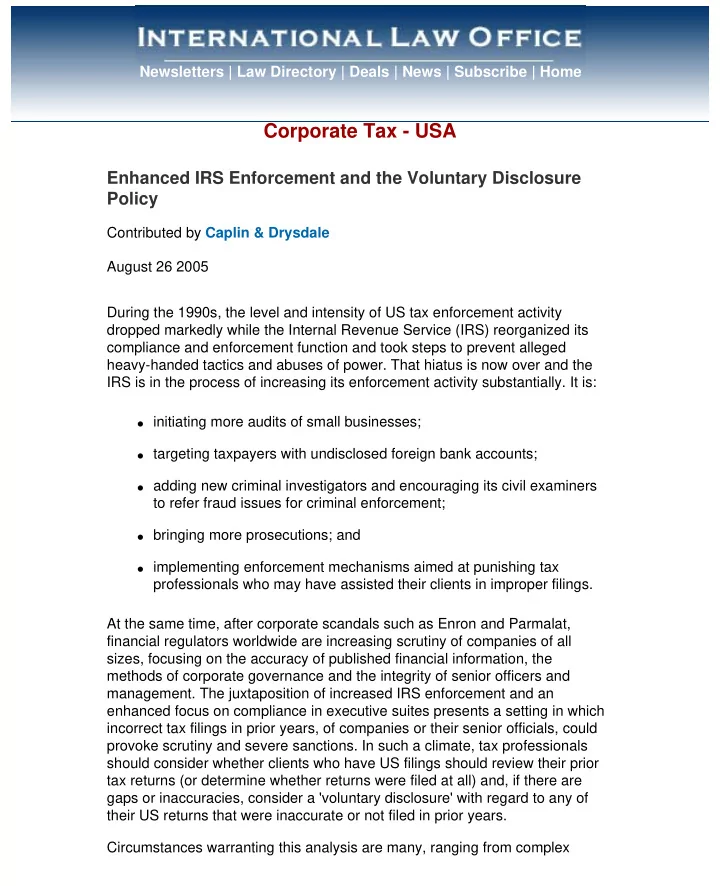

Newsletters | Law Directory | Deals | News | Subscribe | Home Corporate Tax - USA Enhanced IRS Enforcement and the Voluntary Disclosure Policy Contributed by Caplin & Drysdale August 26 2005 During the 1990s, the level and intensity of US tax enforcement activity dropped markedly while the Internal Revenue Service (IRS) reorganized its compliance and enforcement function and took steps to prevent alleged heavy-handed tactics and abuses of power. That hiatus is now over and the IRS is in the process of increasing its enforcement activity substantially. It is: ● initiating more audits of small businesses; ● targeting taxpayers with undisclosed foreign bank accounts; ● adding new criminal investigators and encouraging its civil examiners to refer fraud issues for criminal enforcement; ● bringing more prosecutions; and ● implementing enforcement mechanisms aimed at punishing tax professionals who may have assisted their clients in improper filings. At the same time, after corporate scandals such as Enron and Parmalat, financial regulators worldwide are increasing scrutiny of companies of all sizes, focusing on the accuracy of published financial information, the methods of corporate governance and the integrity of senior officers and management. The juxtaposition of increased IRS enforcement and an enhanced focus on compliance in executive suites presents a setting in which incorrect tax filings in prior years, of companies or their senior officials, could provoke scrutiny and severe sanctions. In such a climate, tax professionals should consider whether clients who have US filings should review their prior tax returns (or determine whether returns were filed at all) and, if there are gaps or inaccuracies, consider a 'voluntary disclosure' with regard to any of their US returns that were inaccurate or not filed in prior years. Circumstances warranting this analysis are many, ranging from complex
international reporting issues to simpler cases of fraud. For instance, some foreign companies that employ US persons pay salary or bonuses in such a manner that these individuals find it both tempting and simple to exclude income from their US returns. 'Off-book' payrolls, paying employees without proper information return reporting and diversions to secret offshore accounts are more common than one might think. US prosecutors can seek indictments of foreign companies whose management knowingly assists US taxpayers in evading tax. Moreover, such wrongful action is often facilitated by US subsidiaries or affiliates, which, with their senior management, may also be exposed to prosecution. Any corporate or business entity that has facilitated its employees' omission of income by inadequate information reporting - or worse, by assisting in the creation or use of undisclosed offshore accounts - faces an increased prospect of detection and severe punishment. Despite ongoing enforcement, the option of making a voluntary disclosure is open to any person or company that has not yet come under IRS examination. In summary, an effective voluntary disclosure requires that: ● any unreported income be from legitimate sources; ● the disclosure be timely and complete; ● the taxpayer pay the tax or engage in good-faith efforts to do so; and ● the taxpayer cooperate in any ensuing IRS inquiry. (1) Where these elements are met, according to IRS policy and practice, the IRS generally will not refer the case for criminal investigation. Voluntary disclosures are available with regard to any potential inaccuracy or omission with regard to a US tax filing. For companies, this may include prior filings of incorrect income tax returns or failure to file Form 941, to pay appropriate withholding taxes and to file proper information returns, such as Forms W2. For US persons with international interests, this may include the failure to file Form 5471 for their controlled foreign corporations. There are various issues that arise in planning an effective voluntary disclosure, such as: ● whether the disclosure will meet the 'timeliness' test - that is, whether it precedes the initiation of an IRS examination or certain other disqualifying events; ● the appropriate number of prior years to include for a 'complete' disclosure; ● reporting of erroneous items that are unrelated to the initial reason why
a disclosure might be considered; ● how to obtain the necessary financial information, sometimes from sometimes reluctant foreign sources; ● the treatment of employees and management who participated in potentially wrongful conduct; ● technical reporting questions, such as paying withholding taxes for individuals who are no longer employed by the company, translation of foreign currency gains and losses into US dollar taxable income and estimating items where information is lacking; ● the appropriate mechanics of the disclosure - that is, whether to arrange for a meeting with appropriate IRS officials or simply file delinquent or amended returns with payment; and ● the risk of a post-disclosure IRS examination, including the potential assessment of, and defence against, civil penalties. In light of the IRS's increasing attention to enforcement and the more intense focus on executive misconduct, it would be appropriate for foreign professionals with US clients, or with non-US clients who have US business or investment activities, to review with them their US tax compliance over the past few years. No company wants to find itself, or a valued member of management, ensnared in an ugly and potentially catastrophic IRS investigation; and no such individual wants to be in the middle of such circumstances. Thus, it may be particularly timely for professionals to reacquaint themselves with the IRS voluntary disclosure policy and consider embarking on such a course if circumstances warrant. For further information on this topic please contact Scott D Michel or Richard E Timbie at Caplin & Drysdale by telephone (+1 202 862 5000) or by fax (+1 202 429 3301) or by email (sdm@capdale.com or ret@capdale.com). Endnotes (1) The details of the IRS voluntary disclosure policy are publicly available at www.irs.gov/newsroom/article/0,,id=104361,00.html. The materials contained on this website are for general information purposes only and are subject to the disclaimer. "This article first appeared in the International Law Office Corporate Tax Newsletter at www.internationallawoffice.com."
Recommend
More recommend